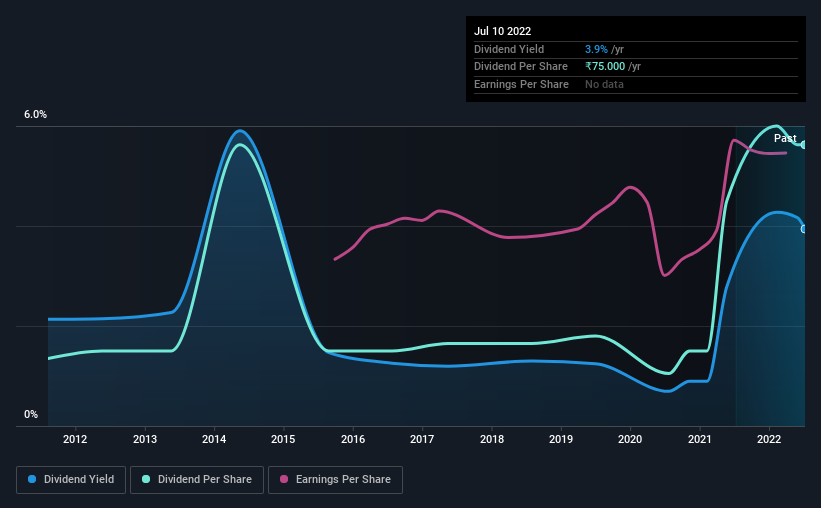Akzo Nobel India's (NSE:AKZOINDIA) Dividend Will Be Increased To ₹35.00

Akzo Nobel India Limited (NSE:AKZOINDIA) has announced that it will be increasing its dividend on the 4th of September to ₹35.00. This makes the dividend yield 4.0%, which is above the industry average.
Check out our latest analysis for Akzo Nobel India
Akzo Nobel India Is Paying Out More Than It Is Earning
While it is great to have a strong dividend yield, we should also consider whether the payment is sustainable. Prior to this announcement, the company was paying out 118% of what it was earning. This situation certainly isn't ideal, and could place significant strain on the balance sheet if it continues.
EPS is set to grow by 4.9% over the next year if recent trends continue. Assuming the dividend continues along recent trends, we think the payout ratio could reach 138%, which probably can't continue without starting to put some pressure on the balance sheet.

Dividend Volatility
Although the company has a long dividend history, it has been cut at least once in the last 10 years. Since 2012, the dividend has gone from ₹18.00 to ₹75.00. This means that it has been growing its distributions at 15% per annum over that time. Akzo Nobel India has grown distributions at a rapid rate despite cutting the dividend at least once in the past. Companies that cut once often cut again, so we would be cautious about buying this stock solely for the dividend income.
Akzo Nobel India May Find It Hard To Grow The Dividend
Growing earnings per share could be a mitigating factor when considering the past fluctuations in the dividend. Earnings have grown at around 4.9% a year for the past five years, which isn't massive but still better than seeing them shrink. The company is paying out a lot of its profits, even though it is growing those profits pretty slowly. Limited recent earnings growth and a high payout ratio makes it hard for us to envision strong future dividend growth, unless the company should have substantial pricing power or some form of competitive advantage.
Akzo Nobel India's Dividend Doesn't Look Sustainable
Overall, this is probably not a great income stock, even though the dividend is being raised at the moment. The track record isn't great, and the payments are a bit high to be considered sustainable. Overall, we don't think this company has the makings of a good income stock.
Investors generally tend to favour companies with a consistent, stable dividend policy as opposed to those operating an irregular one. Meanwhile, despite the importance of dividend payments, they are not the only factors our readers should know when assessing a company. For example, we've picked out 2 warning signs for Akzo Nobel India that investors should know about before committing capital to this stock. If you are a dividend investor, you might also want to look at our curated list of high yield dividend stocks.
New: Manage All Your Stock Portfolios in One Place
We've created the ultimate portfolio companion for stock investors, and it's free.
• Connect an unlimited number of Portfolios and see your total in one currency
• Be alerted to new Warning Signs or Risks via email or mobile
• Track the Fair Value of your stocks
Have feedback on this article? Concerned about the content? Get in touch with us directly. Alternatively, email editorial-team (at) simplywallst.com.
This article by Simply Wall St is general in nature. We provide commentary based on historical data and analyst forecasts only using an unbiased methodology and our articles are not intended to be financial advice. It does not constitute a recommendation to buy or sell any stock, and does not take account of your objectives, or your financial situation. We aim to bring you long-term focused analysis driven by fundamental data. Note that our analysis may not factor in the latest price-sensitive company announcements or qualitative material. Simply Wall St has no position in any stocks mentioned.
About NSEI:AKZOINDIA
Akzo Nobel India
Manufactures, distributes, and sells paints and coatings in India and internationally.
Flawless balance sheet with proven track record.
Similar Companies
Market Insights
Community Narratives




